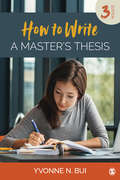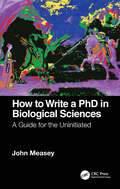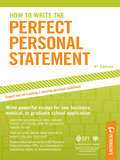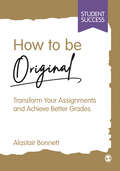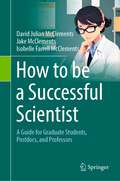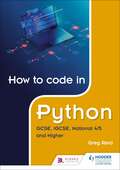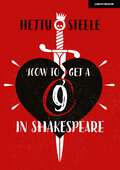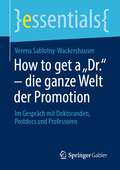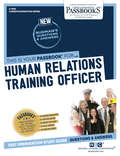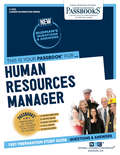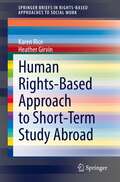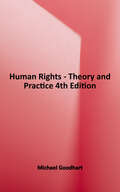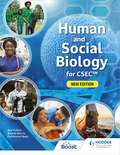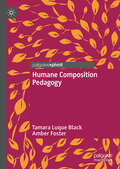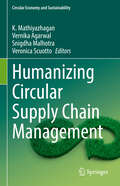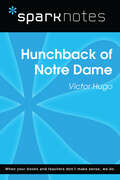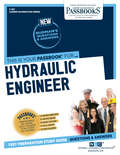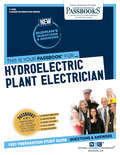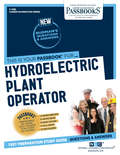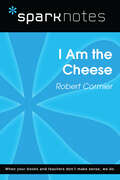- Table View
- List View
How to Write a Master′s Thesis
by Yvonne N. Bui"This is the best textbook about writing an M.A. thesis available in the market." –Hsin-I Liu, University of the Incarnate Word The Third Edition of How to Write a Master′s Thesis is a comprehensive manual on how to plan and write a five-chapter master’s thesis, and a great resource for graduate students looking for concrete, applied guidance on how to successfully complete their master′s degrees. While research methods and statistics courses may teach students the basic information on how to conduct research, putting it all together into a single project and document can be a challenge. Author Yvonne Bui demystifies this process by integrating the language learned in prerequisite methods and statistics courses into a step-by-step guide for developing a student′s own thesis or project.
How to Write a PhD in Biological Sciences: A Guide for the Uninitiated
by John MeaseyYou don’t have to be a genius to write a PhD. Of course, it will always involve a lot of hard work and dedication, but the process of writing is a whole lot easier if you understand the basic ground rules. This book is a guide through the dos and don’ts of writing a PhD. It will be your companion from the point when you decide to do a PhD, providing practical guidance to getting started, all the way through the nuts and bolts of the writing and editing process. It will also help you to get - and stay - in the right mental framework and establish good habits from the beginning, putting you in a commanding position later on. Examples are tailored to the biological sciences, offering a unique reference for PhD students in these disciplines. Embarking on a PhD doesn’t need to be daunting, even if it’s your first experience working within academia. Each short section focuses on writing - considered by many to be the most difficult aspect of a PhD - and delves into a practical detail of one aspect, from the title to the supplementary material. Whether you’re a student just starting your studies, an early career researcher or a supervisor struggling to cope, the book provides the insider information you need to get ahead.
How to Write the Perfect Personal Statement
by Mark Alan StewartThe admissions process for law, business, medical, or graduate school is more competitive today than ever before. Peterson's How to Write the Perfect Personal Statement provides essential tips on how to create and write personal statements that respond to the questions that appear on the applications of many popular graduate schools. The guide also offers great insight on whom to approach for letters of recommendation and how to make the best impression at the interview. How to Write the Perfect Personal Statement features 30 actual samples of successful application essays as well as recommendations from admissions officers on winning strategies that have guaranteed students admission into business, law, medical, and graduate school. How to Write the Perfect Personal Statement offers step-by-step instructions on style, format, concept, and theme; preparation strategies for the personal interview; tactics on whom to ask to write letters of recommendation; top 10 DOs and DON'Ts for writing the essay; tips from admission officials from Columbia, Michigan, and other high-profile schools; and much more!
How to be Original: Transform Your Assignments and Achieve Better Grades (Student Success)
by Alastair BonnettOriginality is needed to achieve top marks in assignments, but what does it even mean? Simply put, it opens doors: to making a difference; to excellent marks, to success. You’ll often find marking criteria stating you need to make an ‘original contribution’, ‘show originality’, or ‘evidence of originality’, yet it is not taught or even explained. This book addresses this, providing you with the techniques and methods you need to transform your work and achieve better grades. It will even give you the upper hand in the age of AI. Key features include: · Diverse examples of originality in writing · "Try this" exercises, allowing you to develop your skills · Different ways of being original, such as taking photos and drawing maps · Originality in different forms of assignments, such as presentations and exams With the guidance in this book, anyone can be original. Student Success is a series of essential guides for students of all levels. From how to think critically and write great essays to boosting your employability and managing your wellbeing, the Student Success series helps you study smarter and get the best from your time at university.
How to be Original: Transform Your Assignments and Achieve Better Grades (Student Success)
by Alastair BonnettOriginality is needed to achieve top marks in assignments, but what does it even mean? Simply put, it opens doors: to making a difference; to excellent marks, to success. You’ll often find marking criteria stating you need to make an ‘original contribution’, ‘show originality’, or ‘evidence of originality’, yet it is not taught or even explained. This book addresses this, providing you with the techniques and methods you need to transform your work and achieve better grades. It will even give you the upper hand in the age of AI. Key features include: · Diverse examples of originality in writing · "Try this" exercises, allowing you to develop your skills · Different ways of being original, such as taking photos and drawing maps · Originality in different forms of assignments, such as presentations and exams With the guidance in this book, anyone can be original. Student Success is a series of essential guides for students of all levels. From how to think critically and write great essays to boosting your employability and managing your wellbeing, the Student Success series helps you study smarter and get the best from your time at university.
How to be a Successful Scientist: A Guide for Graduate Students, Postdocs, and Professors
by David Julian McClements Jake McClements Isobelle Farrell McClementsThis book provides important advice to scientists at all stages of their careers on how to be a more effective and impactful researcher. It provides tips on: designing, performing, and analyzing experiments; writing, submitting and revising manuscripts; preparing and giving scientific talks and posters; writing grant proposals; and writing and defending a graduate thesis. It also provides advice on soft skills, like communication, networking, creativity, critical thinking, and working in teams. A major emphasis of the book is the importance of writing and publishing scientific manuscripts, as this is the main way that scientific knowledge is disseminated, as well as being an important element for building a strong curriculum vitae. The book should be an extremely valuable resource for graduate students throughout their studies but should also be useful for postdocs and professors who want to hone their research skills. The book is written by three scientists from the same family who are each at different stages in their careers and can therefore provide different perspectives. David Julian McClements is a distinguished professor who is currently the most highly cited author in Food Science in the world. He has published over 1300 scientific articles and numerous books. Jake McClements is beginning his career as a lecturer in the United Kingdom, while Isobelle Farrell McClements is just starting her career as a graduate student in the United States.
How to code in Python: GCSE, iGCSE, National 4/5 and Higher
by Greg ReidEnsure every student can become fluent in Python with this highly practical guide that will help them understand the theory and logic behind coding.Written for 14-16-year olds by a leading Python specialist and teacher, and aligned to curriculum requirements, this essential Student Book provides numerous practice questions and coding problems that can be completed as homework or during class - plus answers can be found online at www.hoddereducation.co.uk/pythonextrasHow to Code in Python will:> Provide hundreds of coding examples, puzzles and problem-solving tasks to strengthen computational thinking skills required for GCSE, iGCSE and National 4 / 5 success> Help students become proficient in computational thinking and problem-solving using Python> Provide easy-to-follow explanations of concepts and terminology> Feature plenty of opportunities for self-assessment with solutions to coding problems available onlineThis unique book can be broken down into three key features:> Code theory and explanations (worked examples) in a fun and accessible way> Computational thinking puzzles for the reader to solve; this will greatly improve students' ability to read code and predict its effect and output when run> Programming problems where the reader has to write a program to solve given scenariosGreg Reid is a very experienced Computer Science teacher in Scotland, who has written How to Pass Higher Computer Science and Higher Computing Science Practice Papers for Hodder Gibson.
How to code in Python: GCSE, iGCSE, National 4/5 and Higher
by Greg ReidEnsure every student can become fluent in Python with this highly practical guide that will help them understand the theory and logic behind coding.Written for 14-16-year olds by a leading Python specialist and teacher, and aligned to curriculum requirements, this essential Student Book provides numerous practice questions and coding problems that can be completed as homework or during class - plus answers can be found online at www.hoddereducation.co.uk/pythonextrasHow to Code in Python will:> Provide hundreds of coding examples, puzzles and problem-solving tasks to strengthen computational thinking skills required for GCSE, iGCSE and National 4 / 5 success> Help students become proficient in computational thinking and problem-solving using Python> Provide easy-to-follow explanations of concepts and terminology> Feature plenty of opportunities for self-assessment with solutions to coding problems available onlineThis unique book can be broken down into three key features:> Code theory and explanations (worked examples) in a fun and accessible way> Computational thinking puzzles for the reader to solve; this will greatly improve students' ability to read code and predict its effect and output when run> Programming problems where the reader has to write a program to solve given scenariosGreg Reid is a very experienced Computer Science teacher in Scotland, who has written How to Pass Higher Computer Science and Higher Computing Science Practice Papers for Hodder Gibson.
How to get a 9 in Shakespeare
by Hetty SteeleAre you confident with poetry, an expert in Dickens, at ease with modern drama, but a bit more unsure when it comes to Shakespeare? Then this is the guide for you.Lots of students find Shakespearean language and content the hardest element of the GCSE English Literature course; this book gives you practical strategies you can use to make sure you can access those very top grades. Are you giving the examiner your own personal opinion on the extract? Have you picked out the most important quotes, and broken them down? Does it link to the play as a whole? This guide gives you a range of ways to make sure you’re doing all this and more, and that you achieve as close to full marks as possible, every time.Broken down into the two most frequently studied Shakespearean plays at GCSE (Macbeth and Romeo and Juliet), you can find the text that you need and become an expert in all things Shakespeare. No more woolly points, no more skirting away from analyzing pentametre, no more generic ‘Shakesperean audiences hated…’ It’s time to focus on the 9s.
How to get a 9 in Shakespeare
by Hetty SteeleAre you confident with poetry, an expert in Dickens, at ease with modern drama, but a bit more unsure when it comes to Shakespeare? Then this is the guide for you.Lots of students find Shakespearean language and content the hardest element of the GCSE English Literature course; this book gives you practical strategies you can use to make sure you can access those very top grades. Are you giving the examiner your own personal opinion on the extract? Have you picked out the most important quotes, and broken them down? Does it link to the play as a whole? This guide gives you a range of ways to make sure you’re doing all this and more, and that you achieve as close to full marks as possible, every time.Broken down into the two most frequently studied Shakespearean plays at GCSE (Macbeth and Romeo and Juliet), you can find the text that you need and become an expert in all things Shakespeare. No more woolly points, no more skirting away from analyzing pentametre, no more generic ‘Shakesperean audiences hated…’ It’s time to focus on the 9s.
How to get a „Dr.“ – die ganze Welt der Promotion: Im Gespräch mit Doktoranden, Postdocs und Professoren (essentials)
by Verena Sablotny-Wackershauseressentials liefern aktuelles Wissen in konzentrierter Form. Die Essenz dessen, worauf es als „State-of-the-Art“ in der gegenwärtigen Fachdiskussion oder in der Praxis ankommt. essentials informieren schnell, unkompliziert und verständlichals Einführung in ein aktuelles Thema aus Ihrem Fachgebietals Einstieg in ein für Sie noch unbekanntes Themenfeldals Einblick, um zum Thema mitreden zu könnenDie Bücher in elektronischer und gedruckter Form bringen das Expertenwissen von Springer-Fachautoren kompakt zur Darstellung. Sie sind besonders für die Nutzung als eBook auf Tablet-PCs, eBook-Readern und Smartphones geeignet. essentials: Wissensbausteine aus den Wirtschafts-, Sozial- und Geisteswissenschaften, aus Technik und Naturwissenschaften sowie aus Medizin, Psychologie und Gesundheitsberufen. Von renommierten Autoren aller Springer-Verlagsmarken.
Human Growth and Development - NSOU (B.Ed. - ODL Programme)
by Netaji Subhas Open University Karnataka State Open UniversityPublished by Netaji Subhas Open University, The Bachelor of Education Programme through Open and Distance Learning Mode contains the compulsory course with 4 units in it.
Human Relations Training Officer: Passbooks Study Guide (Career Examination Series)
by National Learning CorporationThe Human Relations Training Officer Passbook® prepares you for your test by allowing you to take practice exams in the subjects you need to study. It provides hundreds of questions and answers in the areas that will likely be covered on your upcoming exam, including but not limited to: identifying and understanding issues concerning intergroup human relations and discrimination, particularly as they affect women, the disabled, the elderly and minorities; understanding and interpreting written material and applying laws relating to human and civil rights; training principles and practices; preparing written material; and more.
Human Resources Manager: Passbooks Study Guide (Career Examination Series)
by National Learning CorporationThe Human Resources Manager Passbook® prepares you for your test by allowing you to take practice exams in the subjects you need to study. It provides hundreds of questions and answers in the areas that will likely be covered on your upcoming exam.
Human Rights-Based Approach to Short-Term Study Abroad (SpringerBriefs in Rights-Based Approaches to Social Work)
by Karen Rice Heather GirvinShort-term study abroad experiences are on the rise across social work programs. This increase is fueled by the Educational Policy and Accreditation Standards of the Council on Social Work Education (CSWE) that social work programs graduate students who are ready to engage diversity and function ethically as global citizens who understand mechanisms of oppression. With the increasing number of short-term study abroad trips, this brief offers a framework that provides strategies for empowering the populations and communities in which these trips occur. Developing short-term study abroad trips from a human rights-based framework rather than a needs-based approach is urgent and necessary, as the community in which the visit will occur is placed at the center of planning efforts and its members become equal and active participants. The brief is accessible and relevant to both instructors and students, with thoughtful emphasis placed in each chapter to align with the needs of each group more distinctly. It is conceived with both travel-based (field education) and classroom learning (pre-trip preparation) in mind. Though developed with more depth, theory, and evidence than a "how-to manual," the brief serves as an exemplary "guide" that prepares those engaging in short-term study abroad trips with information and strategies that are derived from the key concepts of a rights-based approach to field education. Human Rights-Based Approach to Short-Term Study Abroad is essential reading that engages students and faculty with case examples to illuminate the complex concepts that are taught by faculty as well as specific exercises and assignments to guide both faculty and student through the process of developing and implementing short-term study abroad trips. This brief is of immediate relevance for undergraduate and graduate coursework in field education, international social work, human rights, global social work, and macro social work, as well as useful for any practitioner seeking CSWE accreditation.
Human Rights: Theory and Practice, 4th Edition
by Michael GoodhartHuman Rights: Theory and Practice is a comprehensive, interdisciplinary text written by a global team of experts with coverage and content unrivaled by any other text on the market. With contributions from an international panel of experts--including political scientists, lawyers, philosophers, and policy-makers--this text is unmatched in its ability to provide students with a practical, comprehensive, and twenty-first-century perspective on the theory, study, and practice of human rights. In addition to in-depth theoretical content, the book features unrivaled coverage of human rights issues in practice, with a wide range of case studies allowing students to explore true-to-life examples from around the world. There are also dynamic pedagogical features that encourage critical analysis, challenge students to question their assumptions, and facilitate class dialogue on key issues. The fourth edition is fully up-to-date, with new readings centered on recent and relevant issues.
Human and Social Biology for CSEC
by Ann FullickProvide a comprehensive and engaging student-centred approach to Human and Social Biology with an updated textbook aligned to the latest CSEC syllabus for examination from June 2022. - Cover all topics with brand new content on the environment, diseases and pandemics with a full focus on their impact in the Caribbean - Develop subject knowledge with 'Did you know?' features; and consolidate learning using objectives, end of section checkpoint questions and summaries within each chapter- Create meaningful links with 'The Biologist's Toolkit' feature to strengthen maths, science and language skills needed to meet the course objectives- Support application of practical tasks via step-by-step guidance on how to research, present and analyse data, and come to realistic conclusions and recommendations - Avoid common errors with an increased focus on 'What the Examiners say' for problem topicsAdded for the eBook- Aid visual learning using diagrams, illustrations, video links and demonstrations in the eBook
Human and Social Biology for CSEC
by Ann FullickProvide a comprehensive and engaging student-centred approach to Human and Social Biology with an updated textbook aligned to the latest CSEC syllabus for examination from June 2022. - Cover all topics with brand new content on the environment, diseases and pandemics with a full focus on their impact in the Caribbean - Develop subject knowledge with 'Did you know?' features; and consolidate learning using objectives, end of section checkpoint questions and summaries within each chapter- Create meaningful links with 'The Biologist's Toolkit' feature to strengthen maths, science and language skills needed to meet the course objectives- Support application of practical tasks via step-by-step guidance on how to research, present and analyse data, and come to realistic conclusions and recommendations - Avoid common errors with an increased focus on 'What the Examiners say' for problem topicsAdded for the eBook- Aid visual learning using diagrams, illustrations, video links and demonstrations in the eBook
Humane Composition Pedagogy
by Tamara Luque Black Amber FosterHumane Composition Pedagogy (HCP) provides a pedagogical framework for reconciling the current disconnect between neoliberal higher education policies (sometimes called the &“business model&” of higher education) and the demand for kinder and more human-centered instruction. Humane education is a pedagogical model, with origins in secondary education, that considers emotional wellbeing, civic engagement, and intrinsic motivation as central to learning. The authors suggest that humane pedagogies can and should be adapted to higher education contexts, as a means of synthesizing literatures on the pedagogies of inclusion and care from noteworthy scholars including Jamil Zaki, Lisa Blankenship, Asao B. Inoue, Ruchika Tulshyan, and more. Without feeding a crisis narrative or calling for a complete systemic overhaul, HCP offers both an alternative to, and an act of resistance against, dehumanizing forces in today&’s colleges and universities. In exploring its three tenets–empathy, wellbeing, and belonging–the authors call for improved collaboration among key stakeholders (faculty, students, and administrators) to center the human experience in how we approach college instruction, thereby allowing universities to better fulfill their educational missions.
Humanizing Circular Supply Chain Management (Circular Economy and Sustainability)
by K. Mathiyazhagan Vernika Agarwal Veronica Scuotto Snigdha MalhotraThis book the improvements in the circular economy are discussed, and a multidisciplinary approach is taken to examine developments in the recovery of value in CSCM. This book's main goal is to give readers a platform on which to discuss the role of human resources in effective supply chain management in a circular economy and how it may be used. CSCM is a new way of conducting business that offers a waste-free and sustainable substitute to the economy. The concept of CSCM is often incomplete if the human capital aspect of it is not covered. Human resources" or "human capital" represents a person's skills, talents, qualifications, and experiences. Thus, it is inconceivable that the shift to a circular economy would be successful without a new strategy for managing human resources. The COVID-19 epidemic has heightened and realigned the value of human capital inside organizations, whether it is through remote work policies, greater attention to employee health benefits, staff morale, or well-being concerns. It has provided HR professionals with the ability to reevaluate their interactions with employees and has made room for innovative working methods. To end the loop of the linear economic model, sustainability and sustainable improvements are prioritized internationally in all facets of organizations. The book offers the latest deveopments of Circular Supply Chain Management and its applications. It describes the role of human resources in regulating supply chains in the circular economy. The "take-make-waste" economic model in CSCM is encouraging us to rebuild better HR and entrepreneurial policies, which will be vital in building a stronger and more resilient company culture that maintains the value of all resources and is required to get through these trying times. To achieve this goal currently there exists a gap between the present skill sets and the skills required in future to generate new innovation and/or set a new business. In turn, this would request Continuous investment in employees&’ development and training. Alongside, it involves a great attention on how humans are generating new innovations throughout the whole supply chain. At the moment, there is a focus on technologies and less consideration on humans in the field of supply chain management. Again, sustainability seems to be the new core of a company and its circulatory calls for a variety of human skills. In this scenario , the book's ultimate proposal is to give a research viewpoint that included views from policymakers, regulators, and practitioners. The book aims to address the significance of humanizing CSCM and also invites case studies on the topic. This book will meet the demands of research researchers, graduate students, and undergraduate students. Also, it will serve as reference information for academics, researchers, and industry professionals.
Hunchback of Notre Dame (SparkNotes Literature Guide Series)
by SparkNotesHunchback of Notre Dame (SparkNotes Literature Guide) by Victor Hugo Making the reading experience fun! Created by Harvard students for students everywhere, SparkNotes is a new breed of study guide: smarter, better, faster. Geared to what today's students need to know, SparkNotes provides: *Chapter-by-chapter analysis *Explanations of key themes, motifs, and symbols *A review quiz and essay topicsLively and accessible, these guides are perfect for late-night studying and writing papers
Hydraulic Engineer: Passbooks Study Guide (Career Examination Series #C-357)
by National Learning CorporationThe Hydraulic Engineer Passbook® prepares you for your test by allowing you to take practice exams in the subjects you need to study. It provides hundreds of questions and answers in the areas that will likely be covered on your upcoming exam.
Hydroelectric Plant Electrician: Passbooks Study Guide (Career Examination Series)
by National Learning CorporationThe Hydroelectric Plant Electrician Passbook® prepares you for your test by allowing you to take practice exams in the subjects you need to study. It provides hundreds of questions and answers in the areas that will likely be covered on your upcoming exam, including but not limited to: maintenance and repair of mechanical equipment; basic arithmetic; mechanical principles; safety procedures; and more.
Hydroelectric Plant Operator: Passbooks Study Guide (Career Examination Series)
by National Learning CorporationThe Hydroelectric Plant Operator Passbook® prepares you for your test by allowing you to take practice exams in the subjects you need to study. It provides hundreds of questions and answers in the areas that will likely be covered on your upcoming exam, including but not limited to: maintenance and repair of mechanical equipment; basic arithmetic; mechanical and electrical principles; safety procedures; effective work within a staff; and more.
I Am the Cheese (SparkNotes Literature Guide Series)
by SparkNotesI Am the Cheese (SparkNotes Literature Guide) by Robert Cormier Making the reading experience fun! Created by Harvard students for students everywhere, SparkNotes is a new breed of study guide: smarter, better, faster. Geared to what today's students need to know, SparkNotes provides: *Chapter-by-chapter analysis *Explanations of key themes, motifs, and symbols *A review quiz and essay topicsLively and accessible, these guides are perfect for late-night studying and writing papers
